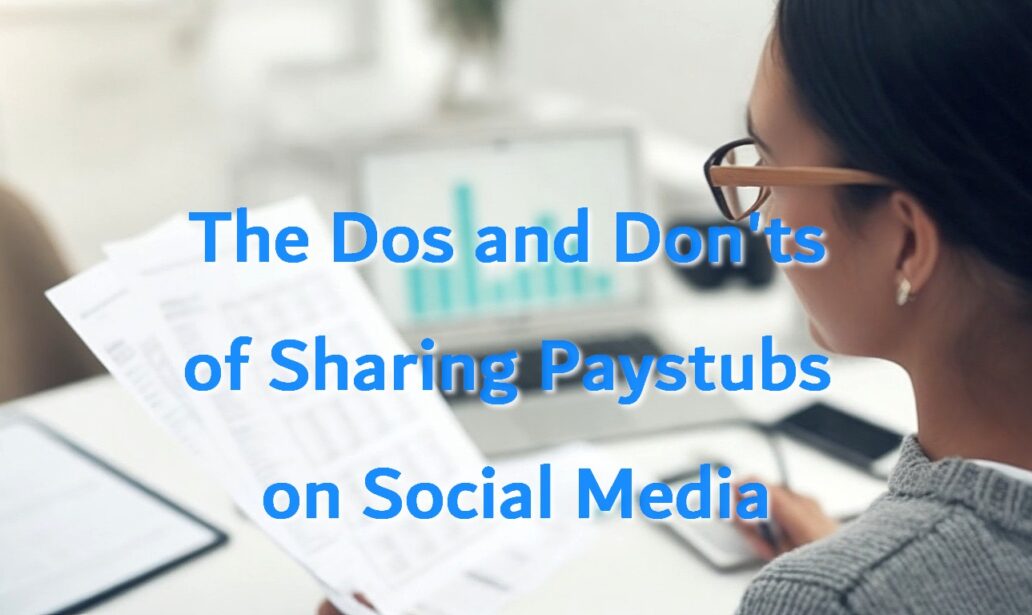In today’s digital age, it’s easier than ever to share various aspects of our lives on social media, from vacation photos to personal achievements. However, one area that requires utmost caution is sharing paystubs. Your paystub contains sensitive financial information, and sharing it on social media can have serious consequences. To help you navigate this tricky terrain, here are five dos and don’ts when it comes to sharing paystubs on social media. You can also check this homepage for more information on the paystub creation and even more!
Dos

Educate Yourself: Before sharing any financial document, it’s crucial to understand what information it contains. Familiarize yourself with your paystub to identify what’s sensitive and what’s not. Common elements on a paystub include your name, employer information, earnings, deductions, and possibly your Social Security number. Ensure you’re aware of the potential risks associated with sharing this data.
Double-Check Privacy Settings: Most social media platforms offer privacy settings that allow you to control who can see your posts. Before sharing any financial information, review your settings to ensure that your posts are only visible to a select group of trusted friends or contacts. Avoid making your paystub public or visible to everyone.
Be Cautious About Oversharing: Even within your trusted circle, consider whether sharing your paystub is necessary. Financial information is highly personal, and sharing it should be done sparingly and with a specific purpose in mind, such as discussing a financial milestone or achievement.
Use Secure Channels: If you need to share financial information with someone specific, opt for a secure and private method of communication. Utilize encrypted messaging apps or email to share such data, rather than exposing it on your social media profiles. This ensures that the information remains confidential.
Monitor for Fraud: Regularly monitor your financial accounts and credit reports for any unusual activity. Sharing financial information online, even with trusted individuals, increases the risk of identity theft or fraud. Promptly report any suspicious activity to the relevant authorities.
Don’ts

Never Share Your Full Paystub: One of the biggest mistakes you can make is sharing your complete paystub on social media. This document contains sensitive information, and exposing it in its entirety can lead to identity theft, fraud, or financial harm. Always redact or blur out sensitive details before sharing any part of your paystub.
Avoid Posting Personal Financial Details: While it might be tempting to brag about a large paycheck or bonus, resist the urge to post specific financial details from your paystub. This not only risks your privacy but can also lead to jealousy or resentment among your social media connections.
Don’t Share When Emotional: Avoid sharing your paystub or financial information on social media when you’re emotional, whether it’s due to a promotion, raise, or bonus or, conversely, if you’re facing financial difficulties. Emotions can cloud judgment, and oversharing during such moments can have long-term consequences.
Don’t Assume All Followers Are Trustworthy: Even if you have a seemingly close-knit online community, remember that you may not know everyone in your social media circle as well as you think. Trust should be established through personal relationships, not solely through online interactions.
Never Share Others’ Paystubs: It’s essential to respect the privacy of others. Never share someone else’s paystub on social media, even if they willingly shared it with you privately. Doing so without their explicit consent can have legal and ethical repercussions.
Conclusion
In conclusion, sharing paystubs on social media should be approached with extreme caution. Protecting your financial privacy is crucial in today’s digital world, and these dos and don’ts can help you make informed decisions about what to share and how to protect your sensitive information online. Remember that once something is posted on the internet, it can be challenging to control its dissemination, so it’s always best to err on the side of caution when it comes to sharing financial information on social media platforms.
